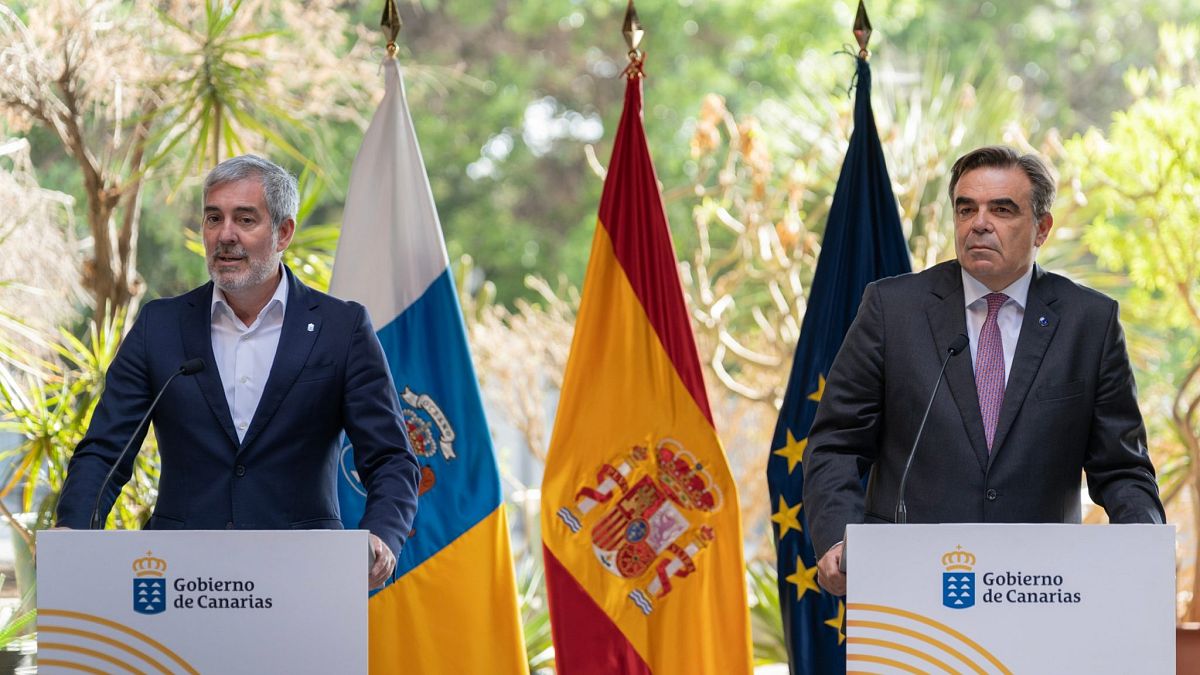The European Union has announced that it will allocate €14 million to Spain’s Canary Islands to improve their capacity to handle the influx of migrants. This funding will come from the European Regional Development Fund (ERDF) as part of a joint operation launched with Frontex. The EU aims to strengthen the safeguarding of the external border through the Canary Islands, which has seen a significant increase in migrant arrivals from West Africa. This allocation follows a previous payment of €20 million from the EU to the Spanish archipelago in March, showing a continued commitment to supporting the region.
Vice-President of the European Commission Margaritis Schinas made the announcement while visiting the Canary Islands and meeting with the region’s President Fernando Clavijo Batlle. Schinas emphasized that the Canary Islands are not alone in dealing with the situation and acknowledged the tremendous pressure faced by Canarian institutions and society. He particularly highlighted the importance of supporting vulnerable groups such as children, aiming to enhance the level of assistance provided to unaccompanied minors through the European Asylum Agency. Schinas plans to visit temporary centers set up for migrants in both Tenerife and El Hierro to assess the situation on the ground and ensure appropriate support is provided.
In response to the funding allocation, the local government of the Canary Islands expressed gratitude to the EU for its assistance and reiterated its commitment to treating migrants arriving on irregular boats with dignity. The Canary Islands have become a major entry point for irregular migration from West Africa, with a significant increase in arrivals through the Atlantic route. Between January and August of this year, the Canary Islands recorded the arrival of 22,300 migrants, a number expected to rise in the coming months. The funding from the EU will help the region enhance its capacity to handle this situation and provide necessary support to those in need.
The joint operation between the European Union and Frontex aims to strengthen border security and improve the reception and assistance provided to migrants arriving in the Canary Islands. By enhancing the capacity of Canarian institutions and addressing the needs of vulnerable groups, such as unaccompanied minors, the EU is working to ensure a more coordinated and effective response to the migration challenge in the region. This funding will support ongoing efforts to manage the influx of migrants and enhance cooperation between European member states on asylum issues. It is part of a broader strategy to address the root causes of irregular migration and strengthen the EU’s external borders.
The EU’s financial support for the Canary Islands demonstrates a commitment to solidarity and cooperation in managing migration flows and addressing humanitarian crises. By providing funding for infrastructure, resources, and assistance programs, the EU is helping the Canary Islands improve their response to the current migration situation and ensure the protection of migrants’ rights. This investment will not only benefit the Canary Islands but also contribute to broader efforts to manage migration in a humane and effective manner, in line with European values of solidarity and respect for human dignity.
Overall, the allocation of €14 million from the European Union to the Canary Islands marks a significant step in addressing the challenges posed by irregular migration from West Africa. By enhancing border security, improving assistance for vulnerable groups, and supporting Canarian institutions, the EU is working to strengthen the region’s capacity to manage the influx of migrants. This funding will help ensure that those arriving in the Canary Islands are treated with dignity and receive the support they need while enhancing cooperation between European member states on asylum issues. The EU’s commitment to supporting the Canary Islands in this challenging situation reflects a shared responsibility to address migration challenges and protect the rights and well-being of all individuals involved.











